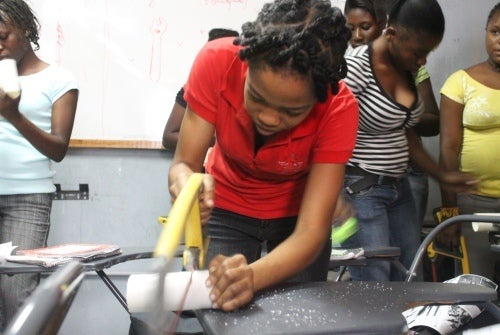
In Haiti, recruiting young women to train for what has traditionally been perceived as predominantly masculine disciplines is a challenging task. Our team discovered that many families wanted to take advantage of an opportunity to educate their daughters, yet they were hesitant because the training being offered was in non-traditional roles.
These female students were going to learn professions attributed to tradesmen such as masonry, carpentry, heavy machinery maneuvering, plumbing and electrical wiring. Fathers and especially mothers were fiercely opposed to having their daughters do this type of work but for different reasons.
Fathers often asked the question: “Why you don’t teach them to do something more respectable, more suited for a girl, to be a secretary, or work in a hospital?” Mothers countered the idea with safety concerns, afraid that their daughters could become easy targets for unscrupulous men in what are clearly male dominated professions.
They feared the possibility of sexual assault; that their daughters would be looked upon as loose women because they had chosen to work in what parents perceived as high-risk environments.
We worked to address these concerns, through extensive discussions, back and forth between community leaders, parents, pastors and the young women themselves. Finally, after three months, we prevailed, the girls and their families bought in, and we identified and enrolled the 200 students required to move ahead with the project.
It was a diverse group; some of the participants were already married with children. Most lived in the community and adjoining neighborhoods of Delmas 32, a densely populated area of 90,000 people, in Port-au-Prince.
Yet all these young women shared a similar background. They came from families in dire financial straits. Their schooling was interrupted due to various problems stemming from the earthquake in January 2010. The disaster had claimed their family homes or livelihoods, leaving them financially vulnerable. A handful of them were still living in camps.
As new students in an innovative pilot program, the girls were eager yet apprehensive. They didn’t know what to expect or how to function in their new-found education environment. Many of them had no experience working in a professional setting, studying on such a spacious campus or working autonomously with such responsibility.
It was also the first time that many of them had been exposed to such diversity. Regardless, they immersed themselves in both the life skills and vocational training, enthusiastic to grasp the new-found tools and knowledge needed to navigate the Haitian professional context.
The life skills training helps these young women balance their personal and professional lives, addressing topics such as money management, health and safety in the workplace, sexual harassment, domestic abuse and reproductive health issues. We ensure they all had a reliable support network, which is important should unforeseen problems arise during their training period. The girls needed access to someone they could confide in and with whom they could work with on finding solutions for any problems that they might face.
At the end of the first phase of the training, 94 of 100 girls had had successfully completed and graduated from the program. Since, a number of new graduates have gone on to find jobs, some as operators of heavy machinery, others in masonry. A few more have even gone further afield finding opportunities in the neighboring Dominican Republic.
Through the process, our team identified areas where these young women may need additional support. One example is certification. This is of utmost importance because it gives them the right to legally practice their new profession. Yet the process is slow and cumbersome. Also, the nature of Haiti’s labor market as well as employment conditions, need greater consideration, especially given the informal nature of the construction sector.
As the program drew to an end, what was most striking was the drastic change in our students’ attitudes and our entire team felt a distinct privilege to bear witness to these changes. Today, these young women regard their future with greater optimism than pessimism and this has been a noteworthy and remarkable transformation. They are more confident in the belief that they can affect the societal change necessary to propel their country forward. They are also aware that they will have to overcome innumerable challenges.
The most exciting outcome is the tangible examples of how they are now taking their control of their own lives. One young woman, who also happens to be a single mother, has begun the construction of her own home. “It’s not anything big,” she told me, “just a room for myself and my child. But I am able to do this now because I am a mason. I have the skills; I don’t have to ask someone else to do it for me.”
Another graduate came back to find me after her training to announce that she had been successful in finding a job. She summarized her experience, which I think mirrors that of many: “We have been through hell and back, we have suffered and suffered,” she said. She went onto explain: “My husband was so upset with me for doing this training because he thought I would leave him. He even ended up kicking me out. But now I have hope for our future and the future of my child. … Now I know that I am able.”
In 2012, J/P HRO embarked on a World Bank pilot project to improve the lives of young girls: the Adolescent Girls Initiative (AGI). Our mandate was to identify 200 potential participants —young women between the ages of 17 and 21— for the project, and develop and maintain a close relationship with these young women, while providing basic life skills. We joined forces with four community organizations, which were responsible for mobilizing and rallying support around the project in target communities.


Join the Conversation